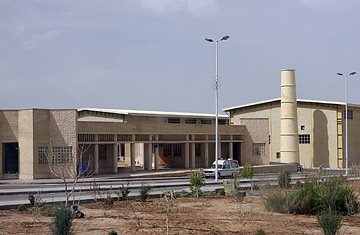
The Natanz nuclear enrichment facility, 180 miles south of Tehran, Iran.
Israeli officials were shocked and disappointed by the U.S. intelligence agencies' report downgrading the risk of Iran's building nuclear weapons. That's because not only do some of the key conclusions of the latest National Intelligence Estimate undercut some of Israel's own assessments, they also seem to dim the likelihood that the U.S. will take military action against Iran's nuclear facilities — a step the Israelis had been quietly urging the White House to take should sanctions fail to stop Iran's uranium enrichment program. With the new U.S. assessment, one Israeli cabinet official told TIME, "It looks like this ends the military option against Iran for now. Israel won't attack alone. Iran's facilities are too many and spread too far apart."
At the Annapolis peace talks last month, the Israeli team — Prime Minister Ehud Olmert, Foreign Minister Tzipi Livni and Defense Minister Ehud Barak — didn't have high expectations for making headway on the Palestinian issue, but they were confident of pressing their case on Iran to a receptive White House. Instead, Barak was taken aside by U.S. Defense Secretary Robert Gates, and told that new intelligence persuaded the Americans that Iran wasn't such a big threat after all.
The Israelis politely disagreed. As Barak later told Israeli Army Radio, "It seems Iran in 2003 halted for a certain period of time its military nuclear program, but as far as we know it has probably since revived it." He added: "We are talking about a specific track connected with their weapons-building program, to which the American [intelligence] connection, and maybe that of others, was severed." The Israeli defense minister implied that the new U.S. assessment was "made in an environment of high uncertainty."
Israeli intelligence sources told TIME that for the past five years, Mossad, Israel's equivalent of the CIA, had made spying on Iran its top priority, and that its assessment is that Iran would be weapons-ready by 2009.
Israeli officials believe their intelligence services are privy to all the information on Iran gathered by their American counterparts, and vice versa. "We stand naked in front of each other, hiding nothing," claimed one Israeli intelligence officer, adding that the two nations' spy agencies often work in tandem to avoid any overlap. Israelis believe the U.S. has reached different conclusions from the same information because it does not feel the threat of Iran's missiles as acutely as Israel does.
Ephraim Halevy, ex-chief of Mossad and now an academic, tells TIME that what hasn't changed, is that the view — reiterated in the NIE — that Iran is "capable of producing a nuclear weapon." He adds, "You put that together with Iran's devious ways and evasive tactics with the U.N. atomic inspectors, and you have a very real threat." Dr. Ephraim Kam, Deputy Director of the Jaffee Center for Strategic Studies at Tel Aviv University, concurs. "Even if it's true that Iran has shut down its military nuclear program, it can start it up at any time," he says.
Israeli intelligence officials plan to ask Washington for clarifications about the NIE report. "It has many inner contradictions," says one cabinet official involved in intelligence matters. Israeli officials don't want to disagree too openly or publicly with the Americans, but they also don't want world opinion to dismiss the threat of Iran's becoming a nuclear power. Foreign Minister Livni has instructed Israeli embassies to maintain a focus on the menace that she says Iran poses to Israel and the West.
For Israel, Iran remains enemy Number 1. As the cabinet official put it, " It's not as if Iran has become Switzerland, only making chocolate. The Iranians still have missiles that can hit us, and they still support Hizballah and Hamas, and they are still calling for the destruction of Israel." That's why Washington's new assessment of Iran's capabilities and intentions is unlikely to reassure those responsible for Israel's security.
